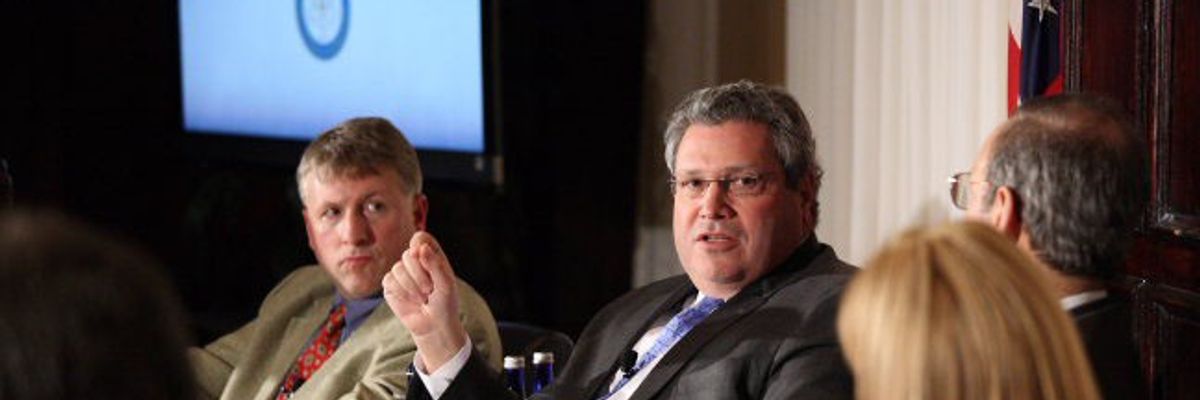In the pages of Foreign Affairs, the indefatigable Robert Kagan recently weighed in with yet another fervent appeal on behalf of empire. Ever the true-blue American, Kagan avoids using the offensive E-word, of course. He favors the term hegemony, which, he explains, is benign, involving neither domination nor exploitation but willing submission—“more a condition than a purpose.” Scratch the surface, however, and “The Price of Hegemony” offers a variation on Kagan’s standard theme: the imperative of militarized U.S. global primacy, whatever the price and with little regard for who pays.
Few would charge Kagan with being a deep or original thinker. As a writer, he is less philosophe than pamphleteer, albeit one possessing a genuine gift for packaging. Recall, for example, his famous assertion that “Americans are from Mars and Europeans are from Venus.” Once deemed to express a truth of Lippmannesque profundity, this warriors vs. wimps formulation has since lost much of its persuasive appeal, not least because the warriors, a.k.a. “the troops,” have not fared especially well when dispatched to liberate, pacify, or depose.
So rather than being enshrined alongside Walter Lippmann, Kagan will likely share the fate of Scotty Reston or Joe Alsop, once prominent Washington-based columnists who are now totally forgotten. Of course, much the same fate awaits the entire gaggle of commentators (this writer included) who pontificate on America’s role in the world under the mistaken impression that senior officials in the White House, Foggy Bottom, or the Pentagon seek their counsel. Rarely do they do so.
That said, Kagan stands out from the rest of the pack in one respect: His knack for combining consistency with flexibility is matchless. He is nothing if not nimble. Whatever may occur in the real world, he is ready with an explanation for how events affirm the indispensability of assertive American leadership. In Washington (and in the pages of Foreign Affairs), this is always a welcome conclusion.
This nimbleness is vividly on display in his most recent essay, its subtitle posing this question: “Can America Learn to Use Its Power?” Kagan arrives at his own answer—the United States not only can learn but must—even as he ignores altogether what the vigorous expenditure of American power over the past two decades has achieved, and at what cost.
So his essay contains various dark references to Russian misbehavior, along with a handful to objectionable actions by China. Perhaps inevitably, Kagan also throws in a few ominous allusions to Germany and Japan in the run up to World War II, in Washington circles the go-to source of authoritative historical instruction. As to post-9/11 U.S. wars in Afghanistan and Iraq, however, he is silent. They qualify for not a single mention—none, zero, null, nada.
According to Kagan, the ongoing Russo-Ukrainian War occurred at least in part due to American passivity. Successive post-Cold War U.S. administrations fell down on the job. Put simply, they did not exert themselves to keep Russia in check. While it would be “obscene to blame the United States for Putin’s inhumane attack on Ukraine,” Kagan writes, to “insist that the invasion was entirely unprovoked is misleading.” The United States had “played a strong hand poorly.” In doing so, it gave Vladimir Putin cause to think that he could get away with aggression. Thus did Washington—as if sitting on its hands during the first two decades of the present century—provoke Moscow.
By “wielding U.S. influence more consistently and effectively,” presidents beginning with the elder Bush could have prevented the devastation that Ukrainians have suffered. From Kagan’s point of view, the United States has been too passive. Today, he writes, “the question is whether the United States will continue to make its own mistakes”—mistakes of inaction, in his view—“or whether Americans will learn, once again, that it is better to contain aggressive autocracies early, before they have built up a head of steam.”
The reference to containing aggressive autocracies early requires decoding. Kagan is dissimulating. What he is actually proposing is further experiments with preventive war, which in the wake of 9/11 became the centerpiece of U.S. national security policy. Kagan, of course, supported the Bush Doctrine of preventive war. He was all in on invading Iraq. Implemented in 2003 in the form of Operation Iraqi Freedom, the Bush Doctrine produced disastrous results.
Now, even two decades later, Kagan cannot bring himself to acknowledge the grotesque immensity of that mistake, nor its side effects, to include the rise of Trumpism and all of its ancillary evils.
“Can America Learn to Use Its Power?” That this rates as an urgent question is certainly the case. Yet to fancy that Robert Kagan possesses the qualifications to offer an intelligible answer is a delusion.
This article has been republished with permission from The American Conservative.
















